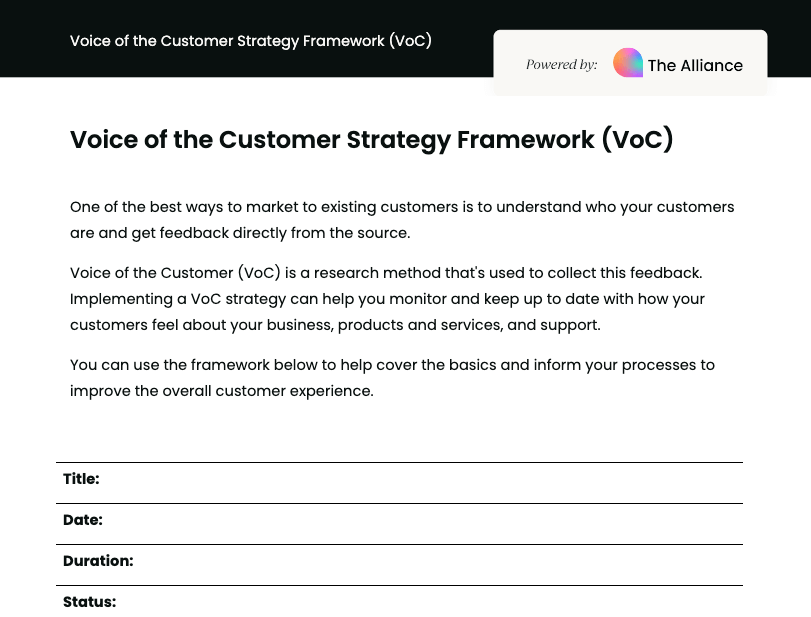What is the Voice of the Customer (VoC) strategy framework?
PMA's Voice of the Customer (VoC) strategy framework is document we've designed to help businesses better understand, and act on, customer feedback.
It's used by marketing and customer success teams to monitor customer sentiment and gather insights directly from the source. By implementing a VoC strategy, you can improve the overall customer experience, enhance customer satisfaction, and drive business growth.
What are the essential components of a VOC strategy document?
- Define: Setting clear objectives and success criteria, identifying key business issues, and mapping the customer journey to focus on the most impactful touchpoints.
- Design: Deciding on the points of contact, feedback types, and reporting channels that best engage your customers and align with your objectives.
- Listen: Optimizing feedback collection through secure, scalable solutions that generate live reports and integrating data from various organizational sources.
- Analyze: Assessing and analyzing the collected data to identify current issues and new opportunities, using both quantitative and qualitative data.
- Act: Implementing tactical and strategic actions based on feedback to address immediate problems and root causes.
- Measure: Continuously measuring the progress of changes to ensure effectiveness and address new pain points as they arise.
- Review: Regularly reviewing the overall strategy to ensure it evolves with your organization and aligns with company goals and values.
How to use this framework
To use this template, simply select your desired format - whether that's a Word doc or a Google doc. Once you have your copy of the framework template, simply follow the steps below to start using it.
Step-by-step guide:
- Define objectives and success criteria: Identify key business issues to address, set measurable objectives, and map out the customer journey to focus on the most impactful touchpoints.
- Design your feedback collection strategy: Decide on the most engaging channels for customer feedback (online, telephone, email, etc.), choose the types of questions to ask, and identify the best reporting channels.
- Optimize feedback collection: Use secure and scalable solutions to gather feedback, integrate data from other organizational sources, and ensure a high response rate for deeper insights.
- Analyze the data: Assess and analyze the feedback to identify current issues and new opportunities. Use dashboards and reports tailored to different departments and include qualitative data like text, videos, and interviews.
- Take action: Implement tactical actions to address immediate problems and strategic actions for recurring issues. This could involve redesigning touchpoints, adjusting scripts, or improving the user interface.
- Measure progress: Set up reminders to evaluate the effectiveness of the actions taken. Regular assessments are necessary to ensure new issues are promptly addressed.
- Review and evolve: Regularly review your VoC strategy to ensure it aligns with your evolving business goals. Use a cross-functional team to seek continuous improvement and refocus on new issues as they arise.
By following these steps, you can create a robust VoC strategy that enhances the customer experience and drives business success.
Download your Voice of the Customer template





















 Follow us on LinkedIn
Follow us on LinkedIn 

.svg?v=85af970283)